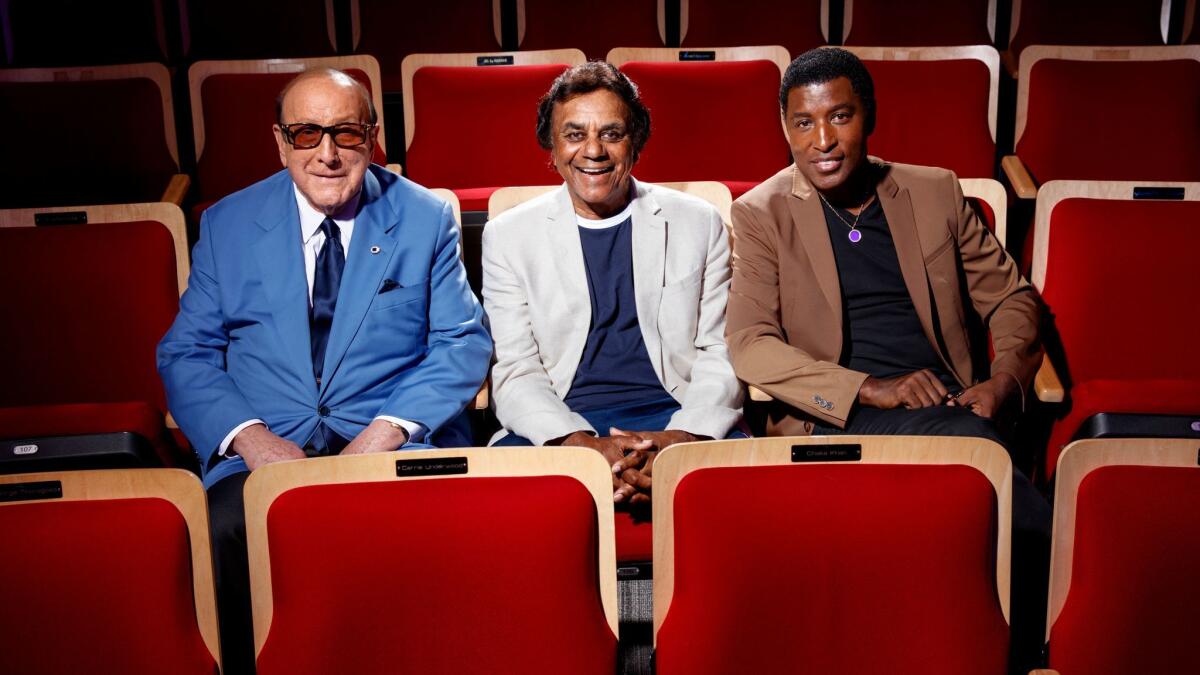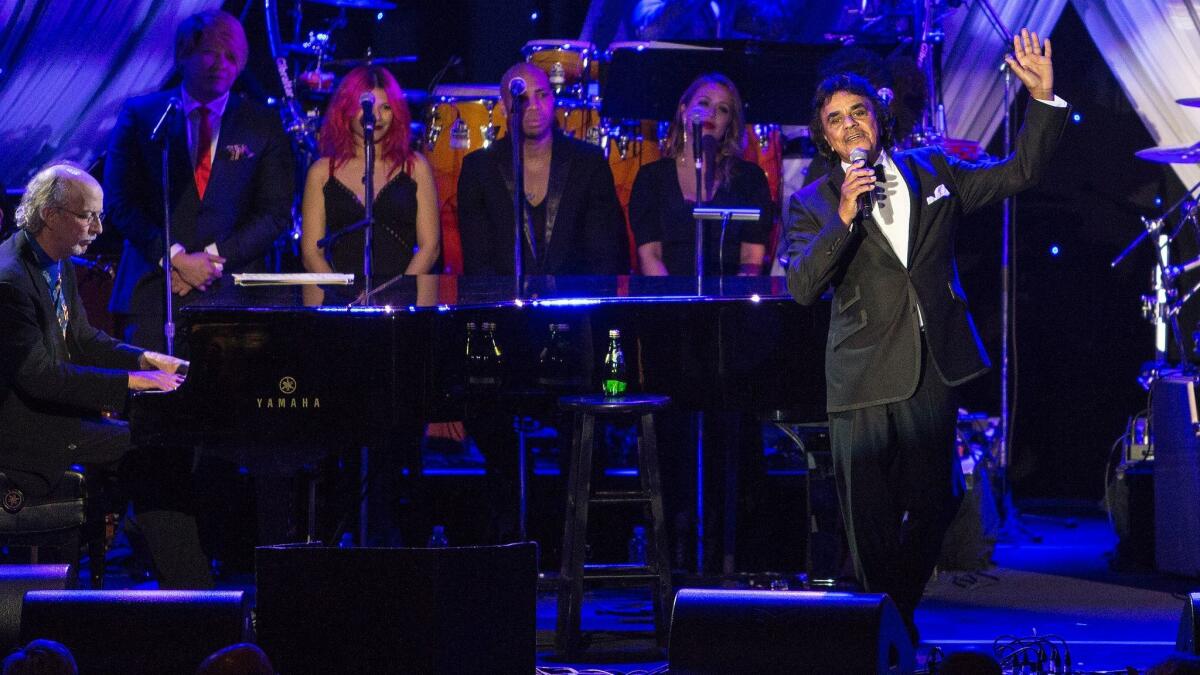How Taylor Swift gave Clive Davis the idea for Johnny Mathis’ ‘Great New American Songbook’

- Share via
The first time Johnny Mathis and Clive Davis worked together closely, things didn’t go quite as planned.
The year was 1973, and Davis — then the head of Mathis’ label, Columbia Records — had paired the old-fashioned romantic crooner with producer Thom Bell for “I’m Coming Home,” an album that set Mathis’ distinctive high-pitched voice against the lush R&B sound known as Philadelphia soul.
“I thought it was one of the best things I’d done, and Tommy loved it,” Mathis said recently. “But then Clive got fired before we could publicize the album, so it just kind of languished.” The singer laughed gently, recalling Davis’ untimely dismissal from Columbia after an expense-account scandal of which he was later cleared.
“Nobody ever really heard it,” Mathis said of the album.
Forty-four years later, the two have reunited for a second collaboration they hope gets a more meaningful look. “Johnny Mathis Sings the Great New American Songbook,” which came out last month, follows a series of similarly titled efforts that Davis, now an executive with Sony Music, has overseen for Barry Manilow, Rod Stewart and Aretha Franklin.
But this time, Davis tweaked his established formula. Rather than summon the nostalgia of a graying audience — an approach that led to multiplatinum sales in the case of Stewart’s “Great American Songbook” discs — Mathis’ album presents the 82-year-old singer as a still-vital interpreter of modern pop, with clever renditions of recent radio staples in place of deeply familiar standards like “Beyond the Sea” and “It Had to Be You.”
“It’s the great new American songbook,” said Davis, 85, emphasizing the crucial word in his raspy New York accent.
Among the songs Mathis tackles: Adele’s Grammy-winning “Hello,” Bruno Mars’ chart-topping “Just the Way You Are,” Keith Urban’s country hit “Blue Ain’t Your Color” and, perhaps most surprisingly, “Happy,” the uptempo secular-gospel jam by Pharrell Williams.
What would Johnny do?
In their original incarnations, each tune is a big vocal record designed to attract attention. But Mathis’ album takes a different tack: Working in the studio with veteran R&B singer and producer Kenny Edmonds, known as “Babyface,” Mathis remade the songs to suit his delicate aesthetic — which, in an era of post-“American Idol” oversinging, means they actually stand out.
“‘How would Johnny do it?’” Edmonds said he repeatedly asked himself while devising his airy arrangements. “Every song came down to that.”
Mathis’ first studio album since a Christmas collection (one of his many) in 2013, “Great New American Songbook” came about as a result of the singer’s performance two years ago at Davis’ annual pre-Grammy gala at the Beverly Hilton.
The executive, who prides himself on a hot ticket of a show that routinely mixes young stars and respected legacy acts, remembered spotting Taylor Swift at a table near the front of the ballroom as he stood onstage to introduce Mathis.
“I told her, ‘Taylor, you’ve had a great few years,’” Davis said. “‘But this next artist, an album of his greatest hits was on the Billboard Top 200 for 10 consecutive years.’”
As he recalled the episode, Davis was seated with Mathis and Edmonds in a green room at the Grammy Museum in downtown Los Angeles, where the three were scheduled to give a talk last week about the new album. (Its release on Sept. 29, one day before the end of this year’s Grammy eligibility period, was certainly no coincidence.)
The space was filled with members of each man’s entourage, including Davis’ pal Nikki Haskell, a fixture of the New York social scene known for her long friendship with Donald Trump. Edmonds and Davis were nattily dressed — as they had been a couple of nights before at the premiere of a splashy new documentary about Davis’ long career — while Mathis wore the track pants and sneakers of a guy who’d come straight from his morning workout.
“Hey, partner!” the singer said when Davis arrived, to which the executive replied, “You’re looking as fit as could be.”

Back at the 2015 party at the Beverly Hilton, Mathis lived up to Davis’ hype, bringing the audience of A-list guests to their feet with effortlessly assured renditions of “Chances Are” and “It’s Not for Me to Say.”
“It was an amazing, amazing thing,” Haskell said. “That’s a tough crowd, but the reaction was incredible.”
“It was like a Beatles moment!” Davis added with typical extravagance, which seemed to make Mathis blush.
“I don’t know, maybe I sang good,” he said.
According to Davis, the singer’s strong showing at the gala led his Sony bosses, Doug Morris and Rob Stringer, to demand that the executive come up with a concept for a Mathis album, and thus the “new songbook” idea was born.
Davis began compiling a list of tunes he thought Mathis could do well, but to help execute the vision he recruited Edmonds, not least because of the producer’s success on Barbra Streisand’s 2014 album “Partners,” which sold more than a million copies.
‘Hello,’ Johnny
The call to join Mathis in the studio was a welcome one, Edmonds said.
“I grew up listening to Johnny — the Christmas records but also the records he did with Deniece Williams,” said the producer, referring to disco-era duets like “Too Much, Too Little, Too Late” and the duo’s take on Marvin Gaye and Tammi Terrell’s “You’re All I Need to Get By.”
The two already knew each other socially; Edmonds remembered meeting Mathis at a Christmas party thrown by pop songwriter Carole Bayer Sager, while Mathis said he saw Edmonds perform recently at a private function at someone’s home.
“Real rich man, in the hills…,” Mathis said, trailing off as he tried to place the name.
“Haim Saban,” Edmonds replied.
Yet the musicians had never collaborated until Davis brought them together.
“To get to work with an icon — I was like, ‘Yes, please,’” the producer said.
Once they started recording, “the important thing,” Edmonds said, “was that we had to make sure this didn’t become a karaoke album” — a charge that could be leveled at some of Stewart’s and Manilow’s records under Davis’ imprimatur.
“This had to be an expression of Johnny.”
“Great New American Songbook” satisfies that ambition; it even brings Mathis’ signature ethereal quality to a pair of lung-busting pop-soul ballads from the 1990s: R. Kelly’s “I Believe I Can Fly” and “Run to You,” first made famous by Davis’ highest-profile creative partner, the late Whitney Houston, in “The Bodyguard.”
In his customary self-effacing manner, Mathis — who’s scheduled to play the Agua Caliente casino in Rancho Mirage on Oct. 28 — said his vocal choices on the album reflect the only way he’s ever known how to sing.
“I have no control over it,” he said. “All I do is open my mouth, and whatever comes out, that’s the way it is.”
Still, he acknowledged that the “juxtaposition” of his delivery and our expectation of a more dramatic voice in a song like “Hello” can provide an effective thrill.
“How does my little thing work with this big thing?” he mused. “I still don’t understand.”
One of Mathis’ favorite cuts on the album is “Happy,” which he said feels to him like a song for kids. Growing up in San Francisco in a family with seven children, the singer more or less raised his three younger siblings while his parents were away at work.
“And I had to sing songs like that for them,” he said. “It’s not contrived; it’s absolutely real. When I heard it, I said, ‘Yeah!’
“I just hope Pharrell likes it,” he said of the multitasking artist whose oversize headgear made waves on social media after the 2014 Grammys. “I like him a lot. I don’t know what he does, really.”
Edmonds and Davis chuckled in seeming recognition of Mathis’ unusual position: a pop star both in and out of time, someone interested in current music but not at all worried about fitting in.
“I mean, I know he does everything,” Mathis continued. “But he confuses me with the hat.
“You don’t need the hat!”
Twitter: @mikaelwood
ALSO
Why losing Tom Petty feels like losing a piece of ourselves
Dave Grohl and Josh Homme on Cal Jam, rock ‘n’ roll and their decades-long bromance
More to Read
The biggest entertainment stories
Get our big stories about Hollywood, film, television, music, arts, culture and more right in your inbox as soon as they publish.
You may occasionally receive promotional content from the Los Angeles Times.











